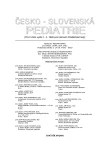-
Medical journals
- Career
Failure of Vaccination against Haemophilus Influenzae Type b
Authors: J. Táborská 1; V. Gutová 2; A. Koubová 1; P. Pazdiora 3; V. Lebedová 4
Authors‘ workplace: Infekční klinika Fakultní nemocnice, Plzeň přednostka MUDr. J. Táborská, PhD. 1; Ústav imunologie a alergologie LF UK, Plzeň přednosta doc. MUDr. P. Panzner, CSc. 2; Ústav epidemiologie LF UK, Plzeň vedoucí doc. MUDr. P. Pazdiora, CSc. 3; Národní referenční laboratoř pro hemofilové nákazy, Centrum epidemiologie a mikrobiologie, SZÚ, Praha vedoucí MUDr. V. Lebedová 4
Published in: Čes-slov Pediat 2005; 60 (5): 288-292.
Category: Case Report
Overview
The authors present a case report of a 19-month child regularly vaccinated with three doses of the vaccine against invasive infections caused by Haemophilus influenzae type b (Hib). In spite of that the patient suffered from bacterial meningitis caused exactly by this microbial strain. The immunological examination demonstrated a deficiency of serum immunoglobulins IgA and IgG, which was probably the cause of insufficient production of antibodies against polyribosil-ribitolphosphate (PRP) antigen Hib after the vaccination and, also, the cause of the disease development. The problems in failure of vaccination against Hib are discussed.
Key words:
Haemophilus influenzae type b, vaccination, meningitis
Labels
Neonatology Paediatrics General practitioner for children and adolescents
Article was published inCzech-Slovak Pediatrics

2005 Issue 5-
All articles in this issue
- Maternal Phenylketonuria (PKU) in the Moravian Region
- A Sudden Cardiac Death at the Child Age
- Long-term Follow-up after Liver Resection in Children
- Long-term Changes in the Growth of Czech Children Population
- Asthma in Children
- Failure of Vaccination against Haemophilus Influenzae Type b
- The Possibilities of Establishing Risk in Development of Premature Atherosclerosis by Imaging Methods at the Child Age
- Lung Sequestration
- Pneumococcal Infection in Children and Their Prevention
- Czech-Slovak Pediatrics
- Journal archive
- Current issue
- Online only
- About the journal
Most read in this issue- Lung Sequestration
- Maternal Phenylketonuria (PKU) in the Moravian Region
- Failure of Vaccination against Haemophilus Influenzae Type b
- A Sudden Cardiac Death at the Child Age
Login#ADS_BOTTOM_SCRIPTS#Forgotten passwordEnter the email address that you registered with. We will send you instructions on how to set a new password.
- Career

